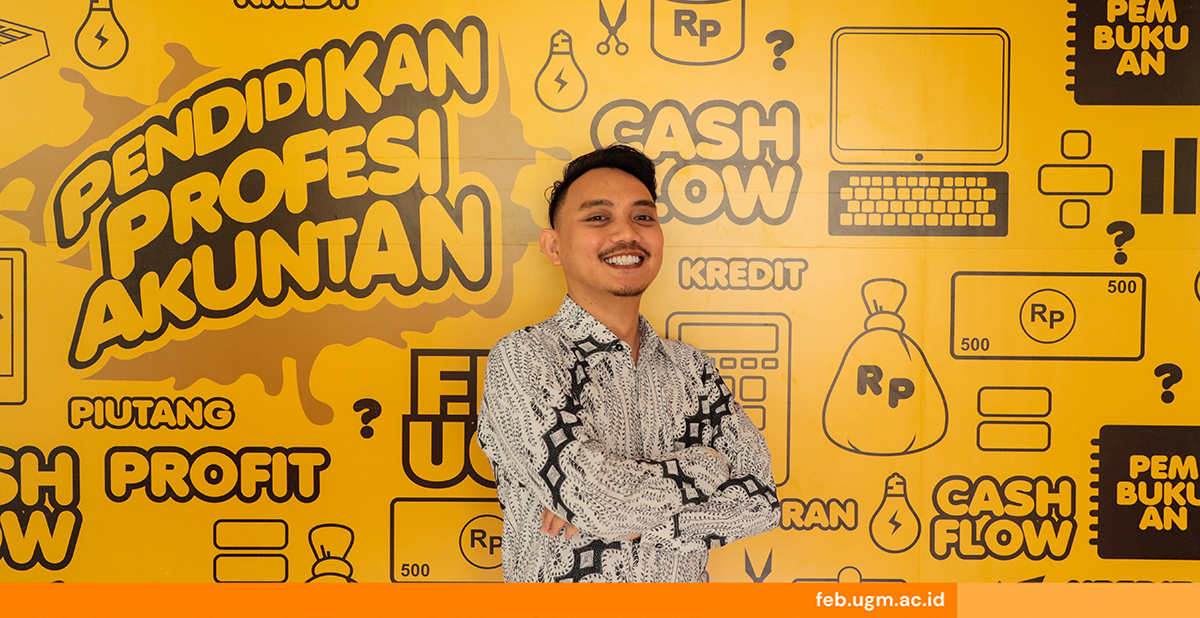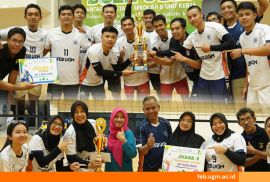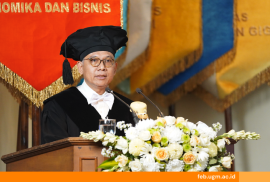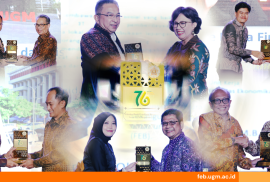
Becoming a public accountant is no easy task. This is also true for Pandu Kurniawan, who, at 29, has successfully become a public accountant at a young age. He will be sworn in as a public accountant in May or June after passing the public accountant exam in January 2025. Pandu, an alumnus of FEB UGM’s Professional Accounting Education Program (PPAk), has had an extraordinary journey in building his career.
Pandu developed an interest in economics and accounting during high school. Initially a science student, he switched to the social science track to study economics.
“I was motivated by my family’s encouragement, as most of them have a background in finance. I also saw great career opportunities, so I decided to pursue accounting,” he said in a recent interview.
After completing his undergraduate studies in accounting at Universitas Brawijaya, Pandu continued his education at PPAk FEB UGM in 2017. He chose not to immediately pursue a master’s degree, instead opting to deepen his undergraduate knowledge through the PPAk program.
Studying at PPAk FEB UGM
Pandu explored options at Universitas Brawijaya, UGM, and UI while searching for a professional program. After thorough research, he chose PPAk FEB UGM because it collaborated with the Indonesian Institute of Public Accountants (IAPI) and its strong support for students pursuing a career in auditing.
“This program has an excellent accreditation, which guarantees the quality of the education, the faculty, and the students. In addition, PPAk offers a joint program with the Master of Accounting at FEB UGM, which shortens the study period and benefits graduates,” he said.
The supportive learning environment at PPAk FEB UGM left a lasting impression on Pandu. Over a year and a half, from matriculation to internship, he gained valuable insights into auditing. The program also provided hands-on experience that instilled integrity and professionalism in future auditors.
“PPAk requires students to complete an internship. I interned at KAP Mahsun, Nurdiono, Kukuh & Partners (MNK & PARTNERS),” said Pandu, who now works as Internal Audit at Telkom Indonesia.
Adjusting to the academic culture at UGM was challenging, but PPAk’s matriculation program helped him make a smooth transition.
“Another challenge was the difference in approach between undergraduate studies and PPAk. While undergraduate studies focus more on theory, PPAk emphasizes practical applications in auditing. This gave me a clearer picture of the challenges and opportunities in the auditing profession before I entered the workforce,” he explained.
Memorable Achievements in the Master of Accounting Program at FEB UGM
After completing the PPAk, Pandu pursued a Master of Accounting degree at FEB UGM in 2018 while participating in extracurricular activities.
“FEB UGM encourages students to develop their skills through student organizations. I served as the president of the Master of Accounting Student Association in 2019 and also led the Postgraduate Student Association in the Entrepreneurship Department,” Pandu said.
Faculty support played a critical role in his academic journey. Pandu’s thesis, which compared unicorn startups Gojek and Grab using the Analytical Hierarchy Process (AHP), was supervised by FEB UGM Dean Prof. Dr. Didi Achjari, S.E., M.Com., Ak., CA.
“At first, I doubted I could do cross-country research, but Prof. Didi kept encouraging me. In the end, I successfully studied Indonesia, Singapore, Thailand, and Vietnam, and my research was published in a Scopus Q3 journal,” he revealed.
Pandu is preparing for a Ph.D. program at Universitas Indonesia through the research track, which requires publication in internationally recognized journals (at least Scopus Q3). He continues to collaborate with Prof. Didi on information systems and accounting research.
“I received approval from my supervisors to use this research for my studies. Continued collaboration between faculty and students in research is critical to contribute to academia and the accounting profession,” he said.
Pandu emphasized that FEB UGM’s values have significantly influenced his academic and professional journey. He highlighted the importance of integrity, professionalism, objectivity, and social responsibility instilled in him during his studies.
“At FEB UGM, we are taught to uphold integrity in all aspects, whether in education or the workplace. As an auditor, objectivity is key to ensuring fairness in assessments,” he explained.
Academic freedom at FEB UGM also played a crucial role in his development. He could choose courses that matched his interests and explore his potential. In addition, the social responsibility programs within the Master of Accounting Student Association positively impacted the community and students.
Becoming a Public Accountant
At first, Pandu was unfamiliar with the Certified Public Accountant (CPA) certification process required to become a licensed public accountant. Over time, PPAk faculty members introduced him to the waiver system and the benefits of PPAk graduates pursuing CPA certification.
“It wasn’t easy. I failed my first CPA exam in 2019 but passed my second attempt and obtained the CPA non-signing certificate,” Pandu said.
After earning his CPA certificate, he pursued a master’s degree at FEB UGM and later joined Telkom as an internal auditor. His exceptional performance led to his selection as one of the top auditors assigned to the Department of State-Owned Enterprises (BUMN).
In 2024, he took the CPA signature exam to become a chartered accountant. Preparing for this exam was challenging, requiring him to attend several workshops on advanced auditing techniques.
“I felt intimidated as the youngest participant and was even advised to wait until I was older before taking the exam. Some participants thought I was too ambitious,” he recalls.
However, he remained determined, believing that there was no reason to wait if he could make a difference now. The road to licensure was not easy, and he faced several failures before finally passing all exam sections in January 2025.
“My CPA journey took an entire year, from January 2024 to January 2025,” he said proudly.
When asked for advice on how to pass the CPA certification, Pandu stressed the importance of setting clear goals – to become a CPA (Certified Public Accountant) or CA (Chartered Accountant).
“If possible, it is even better to obtain both certifications simultaneously. The key is first to decide whether to pursue CA or CPA, as both require a high concentration level,” he advised.
As Indonesia’s business sector continues to grow, Pandu believes the demand for accountants will remain strong despite the challenges posed by artificial intelligence.
“While technology can replace some technical tasks, the role of public accountants remains essential to maintain integrity and professionalism,” he concluded.
Reporter: Shofi Hawa Anjani
Editor: Kurnia Ekaptiningrum
Sustainable Development Goals








